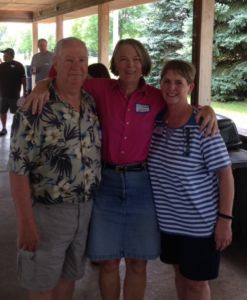Training Wheels for a Lifetime of Hard, Honest Work
When I was in high school, I worked as a gas jockey at the Amoco station in Wayzata. My boss was Duane Marschall; everyone calls him “Farmer.” He and his wife Sue owned and ran a gas station on Lake Street; by the late 1970’s when I worked there, they had moved it to an even better location on Wayzata Boulevard by the entrance ramp to what is now 394.
Farmer was demanding of his young employees, most of whom were in high school. We had to work hard. Full service at his station was impressive. We’d offer to “fill it up” and then check the oil and transmission levels (back in the day when these needed more regular attention than they do now)—and then clean every car window, while selling wiper fluid and new blades as needed.
When we were not offering full service on the drive, we were stocking shelves, cleaning tools and the station, bathrooms included. You did not just stand around. After the “self-serve” option was introduced, Farmer still had us approach every car with an offer to check fluid levels and clean the windows if the full-service drive was quiet. Every night after the mechanics had gone home and the drive was quiet, we scrubbed the two bays with soap and hot water.
We all worked hard but no one worked harder or longer hours than Farmer. At the end of a dinner-time rush, Farmer and I would occasionally sit on the curb and talk before he went home to Sue and his daughters for dinner. Sue ran the books, so Farmer could run the station. He was like a wise uncle to all of us, dispensing a tough but generous love for anyone who needed it. You did not want to disappoint him but we all did from time to time.
Farmer was the only gas station owner in my neck of the woods to hire young women; there were three of us in Wayzata when I worked there (me and the Vest sisters). We were kind of a novelty. It took some regular customers a while to adjust to us, but over time, everyone did because we were as good as the guys, maybe even a little better because we had something to prove.
We did everything the guys did; the only concern for Farmer was when the girls closed at night. That meant being alone on the last shift until 11:00 pm. So, he asked the police to keep an eye on the station, stop by from time to time and encouraged us to be alert. But he let us close.
 Last weekend I attended a reunion of Wayzata Amoco employees in Lion’s Park in Shakopee. The Marschall family settled in Shakopee in the mid-19th century. There is even a major road named after the family farm.
Last weekend I attended a reunion of Wayzata Amoco employees in Lion’s Park in Shakopee. The Marschall family settled in Shakopee in the mid-19th century. There is even a major road named after the family farm.
Farmer and Sue gather their “kids” every five years to hug, eat pizza and exchange stories about what we’ve been doing since we worked at the station. His graduates include mechanics, a pharmaceutical salesman, a librarian, and one is a lawyer working at the Center. Farmer hugs us all and tells us how much he loves us, how proud he is of all we have done—always asking us to find missing friends for next reunion in 2023.
I do not know how many young people got their start with Farmer and Sue over the years; I imagine dozens and dozens. I think I was paid minimum wage, though maybe he could pay us less because we were under 18 (not sure). The minimum wage was $2.30 in 1977; my on-line calculator says that is the same as $9.74 in 2018. That same calculator says that if Farmer had paid me the equivalent of $15 an hour, the wage would have been $3.55 an hour.
None of us were worth $2.30 an hour, let alone $3.55 an hour, for quite a while. Even if we hustled, we needed to be trained, corrected, reminded, and then reminded again to get out there, a customer was waiting on the drive. You were late to work. You left streaks on a windshield or had to learn how to change wipers, or even install a new headlight. Some people never got the hang of it and either quit or were gently shown the door.
Eventually we earned every penny and got raises if we stuck around. But Farmer patiently trained us all and modeled a hard-working boss and successful entrepreneur.
If Farmer and Sue had been forced by the government to pay us the equivalent of $15 an hour, I think they would have hired older people, and avoided teenagers altogether. We were not worth the money or the hassle; that would have been tragic as our basic training was priceless for a lifetime of hard, honest work.